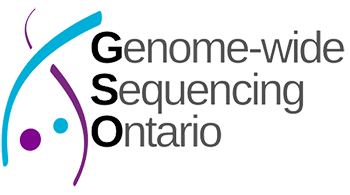Genome-wide sequencing (GWS) can also identify medically actionable secondary findings. These are variants in genes that are not related to the primary medical conditions for which the test has been offered, but which can cause other medical conditions during childhood and/or later in life.
If a medically actionable secondary finding that can cause another medical condition is identified, clear medical recommendations can be made to reduce the risk of this condition impacting a person’s health in the future.
Ontario patients receiving GWS have the option to receive medically actionable secondary findings as defined by the American College of Medical Genetics and Genomics (also referred to as the ACMG SF v3.2). Findings expected or known to be disease-causing that are identified in a gene that is not included in the ACMG SF v3.2 gene list may also be reported if considered to be medically actionable (i.e. Incidental findings).
Probands
- In children, secondary findings that reveal a risk for a condition that is medically actionable during childhood* will be reported. Parents/caregivers may choose for the proband to also have the analysis of genes associated with adult-onset conditions†.
*ACTA2, ACTC1, ACVRL1, APC, APOB, ATP7B, BAG3, BMPR1A, BTD, CACNA1S, CALM1, CALM2, CALM3, CASQ2, COL3A1, DES, DSC2, DSG2, DSP, ENG, FBN1, FLNC, GAA, GLA, HNF1A, KCNH2, KCNQ1, LDLR, LMNA, MAX, MEN1, MYBPC3, MYH11, MYH7, MYL2, MYL3, NF2, OTC, PCSK9, PKP2, PRKAG2, PTEN, RB1, RBM20, RET, RPE65, RYR1, RYR2, SCN5A, SDHAF2, SDHB, SDHC, SDHD, SMAD3, SMAD4, STK11, TGFBR1, TGFBR2, TMEM43, TMEM127, TNNC1, TNNI3, TNNT2, TP53, TPM1, TSC1, TSC2, TRDN, TTN, VHL, WT1
† BRCA1, BRCA2, PALB2, MLH1, MSH2, MSH6, PMS2, MUTYH, HFE (C282Y only), and TTR
- In mature minors, secondary findings that reveal a risk for a condition that is medically actionable during childhood* will be reported. The analysis of genes associated with adult-onset conditions** is optional.
- In incompetent adults, secondary findings will be reported, unless the patient expressed wishes to the contrary while still competent.
- For competent adults, the analysis of secondary findings is optional.
Parents and other family members
An individual analysis for secondary findings is not performed on parents and/or other family members. However, parents and/or family members who have submitted a sample to aid with the analysis of the proband’s genomic data can receive information about their status relating to secondary findings identified in the proband.

